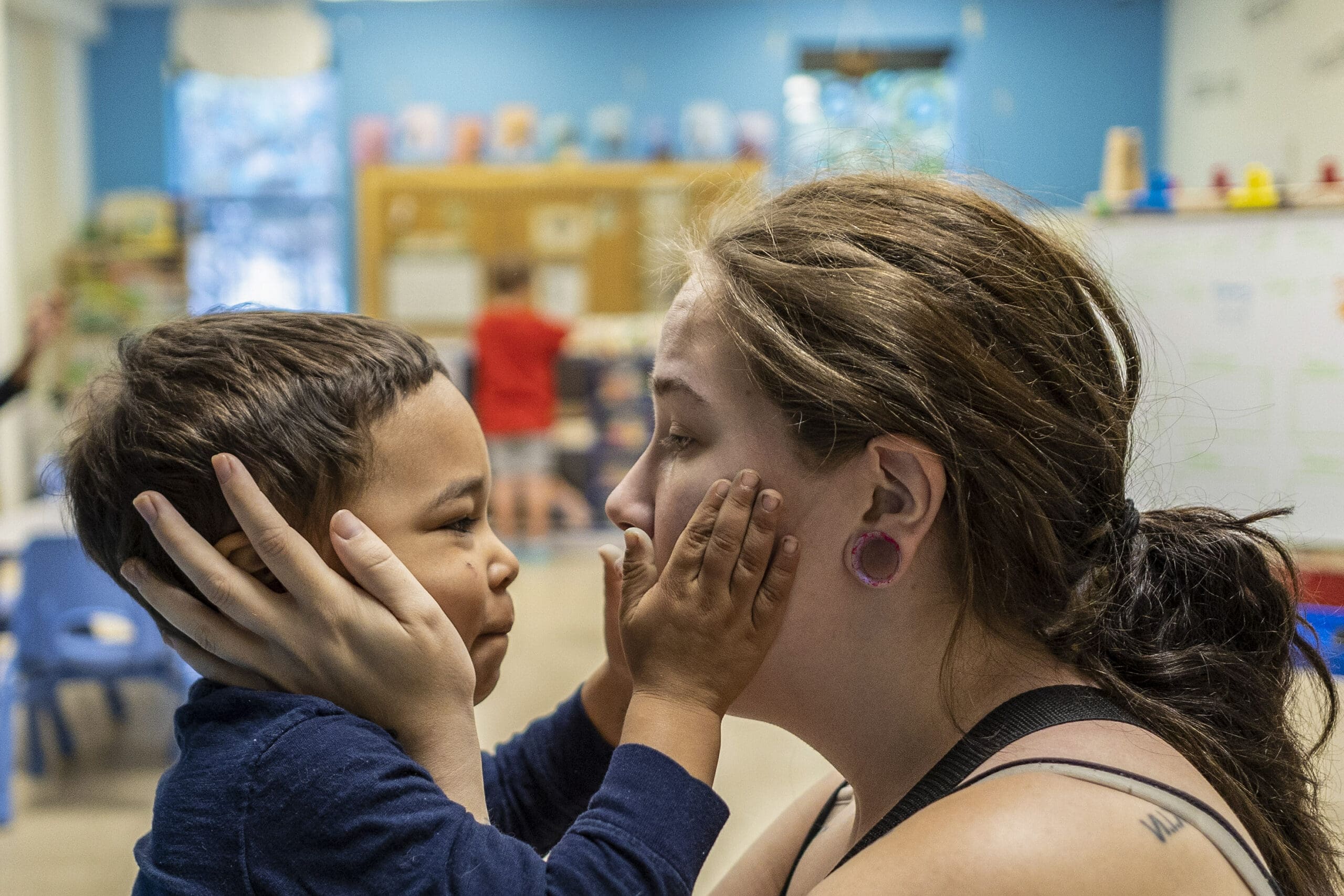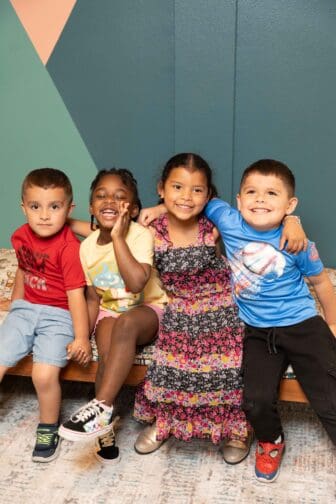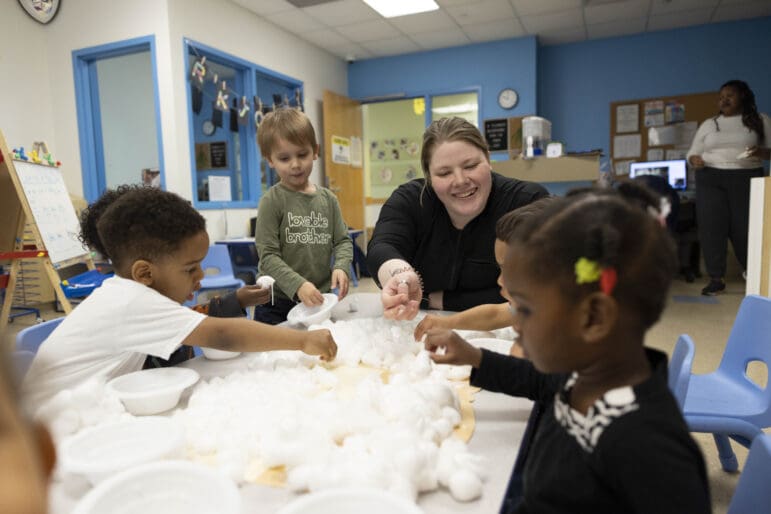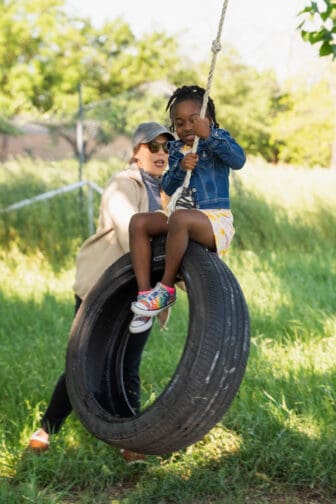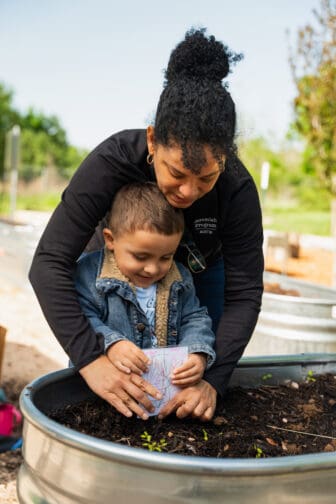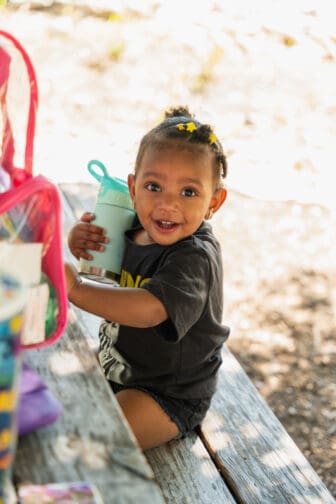Supporting Moms, Nurturing Futures
Jeremiah Program’s innovative Child Development Centers impact multiple generations.
Jeremiah Program has always known that you can’t support moms without also supporting kids. To realize the mission of disrupting the cycle of poverty two generations at a time, JP has always looked for opportunities to serve our littlest ones. At the Minneapolis, St. Paul, Rochester-Southeast Minnesota, Fargo-Moorhead, and Austin locations, this includes operating Child Development Centers (CDCs) — a cornerstone of JP’s commitment to holistic support for families.
Embedded within JP’s five residential campuses, these centers provide affordable, high-quality early childhood education for children from infancy through preschool.
“I love early childhood education because it fosters a true love of learning in kids,” says Minneapolis CDC Director Meera Kannan. “If you can foster that love at a young age, it goes with them as they grow.”
Gaining the critical social and cognitive skills necessary to succeed in school is a benefit to any child’s future and can be especially helpful for babies and toddlers who have experienced economic scarcity and insecurity early in life.
“Early childhood experiences very genuinely dictate a person’s trajectory,” says Jamie Mitchell, director of the Rochester CDC. “A big focus during these years is being prepared for kindergarten in all areas. Kids who enter kindergarten prepared are more likely to read at grade level, to persist through school, to earn higher wages…the list goes on.”
More Than a Daycare
CDC teacher Adrianee Powell knew she wanted to work in early childhood education but found that many facilities lacked the structure and intention necessary to help young children stay on target.
“From how many years I’ve been in childcare, I’ve never worked at a place like this before,” Adrianee says. “I have to say it’s a special place. It’s not just a daycare center. It really is a child development center.”
Austin CDC Director Olymaris Corchado agrees. “Our center is all about keeping abreast of the latest research and approaches in early childhood education,” she says.
“We’re not just here babysitting or watching children. We’re teaching, and every part of the day is a teachable moment.”
Maintaining such elevated standards doesn’t happen by accident. JP recruits only highly qualified teachers to work in the CDCs, maintaining an impressive teacher-to-student ratio. The organization compensates CDC staff at rates that far exceed local and national averages. And even the youngest babies are taught from a curriculum that blends quality education with personalized care. This intentional approach helps JP kids reach key developmental milestones, learn social and emotional skills and, as they grow, build the academic foundation they’ll need to succeed in K-12 schools.
These skills make a difference to JP moms, too, who report they can see growth in their children they didn’t know was possible.
“[At parent-teacher conferences] they told me my son’s favorite thing to say is, ‘Mom does this for me. Mom does that for me,’” says JP mom Suldana, whose children attend the St. Paul CDC. “But within a couple of months of him being in that childcare, both of my kids became very independent. They started doing everything by themselves, and that helped me a lot.”
“I don’t have any worries when I send [my children] to daycare. I know they’re getting that love and attention that I’d give them.”
Octavia Clinton, JP Minneapolis mom
A Cornerstone of Two-Gen Programming
Like all CDC staff, Denise Taylor is clear that moms are their children’s first and most influential teachers. That’s why, as a community teacher at the St. Paul campus, she makes sure to keep an open dialogue with moms so she can help take as much of the mystery and anxiety out of parenting as possible.
“Not only do we educate the children; we educate the moms as well,” she says. “We deal with mostly younger moms [or] first-time moms. Their intentions are good, but there are certain things that they just don’t know.”
Adrianee has a unique perspective on how CDCs support moms. In addition to being a teacher, she brought her own child to the St. Paul CDC over a decade ago when she was a JP mom.
“[The teachers would] ask me questions about what’s going on at home, and I remember one thing very specifically: ‘Do you hug your child every day?’ I’m thinking, ‘Every day?’ That wasn’t a thing in my household, to be hugged every single day,” Adrianee remembers. “I had no experience with babies or infants or anything…but [the CDC teachers] made me feel more confident taking care of my baby, because I wasn’t that confident with it. I needed all the advice that I could get.”
Now, as a teacher herself, Adrianee knows that those relationships are a key ingredient of the CDC’s special sauce. By maintaining close ties with moms, staff are in a much better position to positively influence kids — in the classroom and at home.
“We try our best to give advice without being judgmental. And I think that’s really important so people don’t feel like they’re being looked down upon for even being in the program in the first place or… as if they don’t know what to do with their child,” she says. “We’re there to help their children for sure, but we still want to be there for mom too.”
Austin mom Jessica Rodriguez recalls one conversation with a JP teacher that resulted in potentially life-changing services for her child.
“I didn’t notice that my son needed speech therapy, and then one of the teachers was like, ‘Hey, have you heard of this? This is what it is, what it’s gonna do, and how it might help your son,’” Jessica says. “I feel like they are looking out for my son and for all the kids as well — making sure they meet their developmental milestones.”
“If I’m struggling or I don’t know what to do, I can feel comfortable to ask them,” says JP mom Nicole Carlson, whose children attend the Rochester CDC. “[There’s] just a lot of connection … a lot of relationship building, on a personal level. They are really invested.”
The CDCs are part of a holistic program that supports moms based on their strengths, challenges, and life circumstances. This proximity to moms gives teachers the opportunity to coordinate with coaches and other JP staff to make sure families are getting every resource they need.
“The integration between the coaching team and the teaching team is a really good resource that doesn’t exist anywhere else,” says Lily Crooks, who directs the St. Paul CDC. “We’re not just willy-nilly sharing information, but if we see a behavior or an issue, we have someone to bounce that off of in a safe and confidential way that other childcare centers don’t have.”
A Space for Single-Parent Families
The uncertainties of parenting are always challenging, but for single moms going back to college, leaving their children — often for the first time — is one stressor the CDCs can help alleviate. The proximity of CDCs to residential facilities makes it easier for moms to pursue their education, knowing their children are being well cared for in a convenient location with flexible hours.
“It’s hard to trust people with your children, and I just feel so comfortable,” says Minneapolis mom Octavia Clinton. “I don’t have any worries when I send them to daycare, so that makes me feel awesome. … I know they’re getting that love and attention that I’d give them.”
“[Without the CDC], I would not go back to school. I know that’s something I would give up; that’s something I cannot fit on my plate as a full-time mom,” says Suldana. “[JP is] definitely targeting two generations.”
In addition to partnering with moms to help them and their children succeed academically, the CDCs also offer an environment where moms are celebrated and single-parent homes carry no stigma.
“It’s a single-mom community, so [my children] never feel left out,” says Suldana. “Before, we were in a big household and they saw my sister with her husband and her child, and they’re like, ‘How come my cousins have a dad around or in the house?’ But coming here, they see … a lot of other people [whose parents] live in two different households, and I feel like all the kids are sharing their experiences as well, which is really pretty cool.”
“We’re not just here babysitting or watching children. We’re teaching, and every part of the day is a teachable moment.”
Olymaris Corchado, Austin CDC Director
Friendships among CDC kids often spill over into the residential building, offering an extra layer of fun and stability at home and opening up the possibility for connections among moms as well.
“The kids can see kids that they see at school and feel comfortable and safe,” says Nicole. “It’s like a whole family. Even if you don’t necessarily know somebody, your kids will know them because they go to the CDC together … and so then you get to meet these new people. The kids are also helping us create relationships between the moms.”
Fargo CDC Director Ciara Langehaug notes that, as a single mom herself, she’s keenly aware of how the shared experience of solo parenting can create a powerful bond.
“At least once a day, I hear, ‘I’m so grateful you understand.’ ‘Thank you for being there.’ ‘Thank you for understanding,’” Ciara says. “That was something I didn’t expect, but I do notice that it has really connected myself with some of those moms that were quiet. Once they found out I am a single mom and I’m here for them and I fully understand, that really broke some of those harder shells.”
JP’s five CDCs embrace the many features that set them apart from traditional preschools and daycares. Like the rest of JP, they are not afraid to set the bar high, challenge the status quo, forge deep, respectful relationships with families, and show the world what single moms and their kids are capable of.
It’s a model many CDC teachers hope will spread.
“I dream of the day when we will recognize that universal early childhood education is key to the success of our country as a whole,” says Meera. “If we could make sure that every child had quality early childhood education, I strongly believe it would have the greatest impact on our society.”
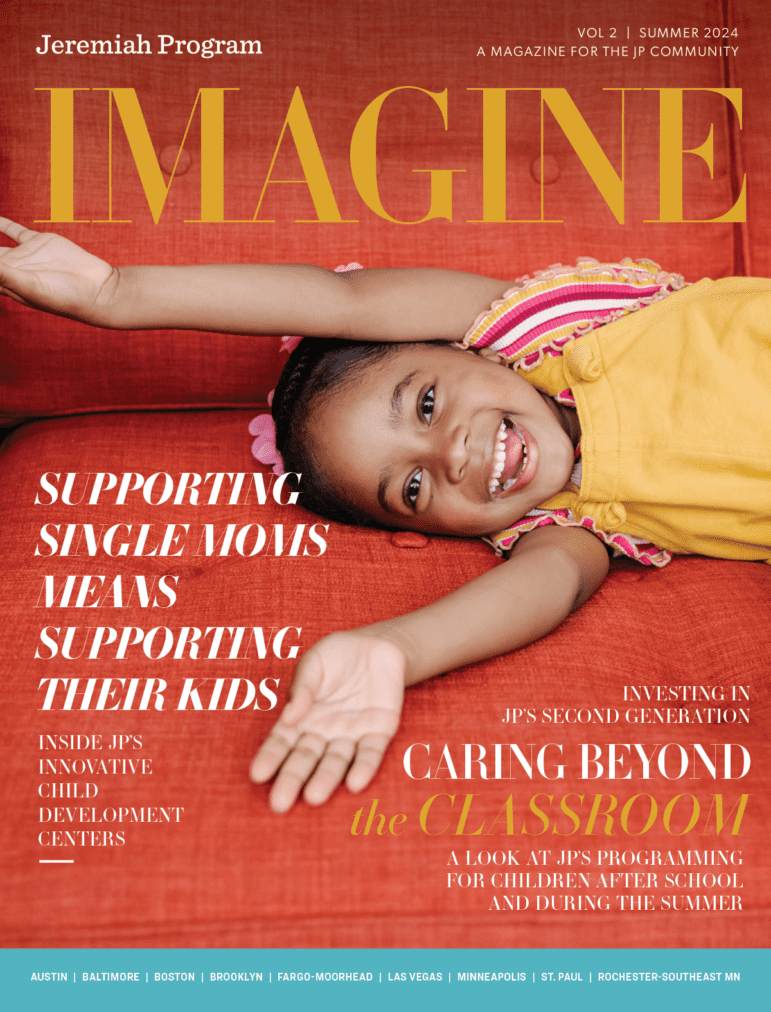
Find this story and more in our magazine, Imagine!
At Jeremiah Program, we know that supporting single mothers means supporting their children. That’s why we’re proud to join the whole family’s journey — two generations at a time — and that’s what the second issue of Imagine is all about.
Hear directly from the college-bound children of a JP alum what their mother taught them about education. Read a Q&A with the entrepreneur daughter of one of JP’s first graduates, who earned her degree in 2000. Learn how JP is investing in the next generation through 529 accounts, tutoring, summer enrichment, and more.
Every family deserves the opportunity to plant seeds for the next generation to grow strong, develop, and thrive. You can support the sowing of those seeds for JP families.

